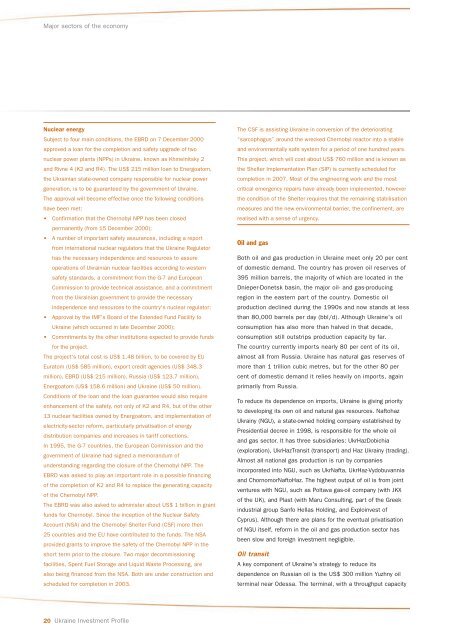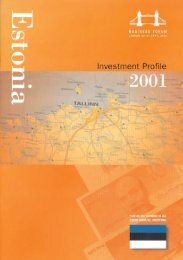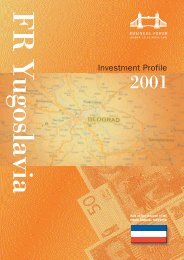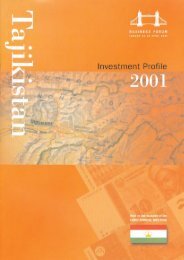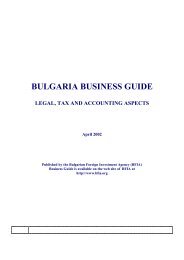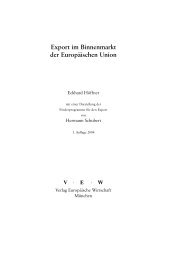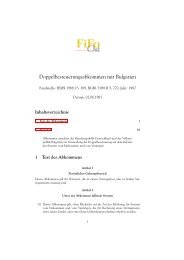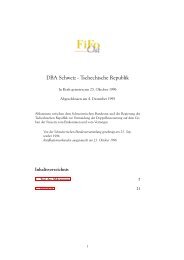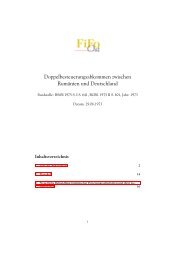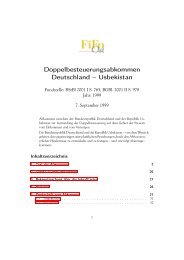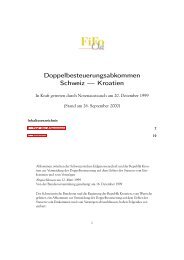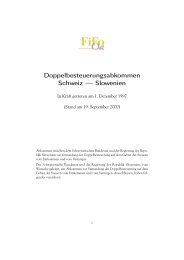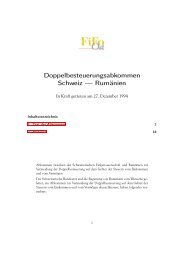EBRD activities in Ukraine - FiFo Ost
EBRD activities in Ukraine - FiFo Ost
EBRD activities in Ukraine - FiFo Ost
Create successful ePaper yourself
Turn your PDF publications into a flip-book with our unique Google optimized e-Paper software.
Introduction<br />
Major sectors of the economy<br />
Nuclear energy<br />
Subject to four ma<strong>in</strong> conditions, the <strong>EBRD</strong> on 7 December 2000<br />
approved a loan for the completion and safety upgrade of two<br />
nuclear power plants (NPPs) <strong>in</strong> Ukra<strong>in</strong>e, known as Khmelnitsky 2<br />
and Rivne 4 (K2 and R4). The US$ 215 million loan to Energoatom,<br />
the Ukra<strong>in</strong>ian state-owned company responsible for nuclear power<br />
generation, is to be guaranteed by the government of Ukra<strong>in</strong>e.<br />
The approval will become effective once the follow<strong>in</strong>g conditions<br />
have been met:<br />
• Confirmation that the Chernobyl NPP has been closed<br />
permanently (from 15 December 2000);<br />
• A number of important safety assurances, <strong>in</strong>clud<strong>in</strong>g a report<br />
from <strong>in</strong>ternational nuclear regulators that the Ukra<strong>in</strong>e Regulator<br />
has the necessary <strong>in</strong>dependence and resources to assure<br />
operations of Ukra<strong>in</strong>ian nuclear facilities accord<strong>in</strong>g to western<br />
safety standards, a commitment from the G-7 and European<br />
Commission to provide technical assistance, and a commitment<br />
from the Ukra<strong>in</strong>ian government to provide the necessary<br />
<strong>in</strong>dependence and resources to the country's nuclear regulator;<br />
• Approval by the IMF's Board of the Extended Fund Facility to<br />
Ukra<strong>in</strong>e (which occurred <strong>in</strong> late December 2000);<br />
• Commitments by the other <strong>in</strong>stitutions expected to provide funds<br />
for the project.<br />
The project's total cost is US$ 1.48 billion, to be covered by EU<br />
Euratom (US$ 585 million), export credit agencies (US$ 348.3<br />
million), <strong>EBRD</strong> (US$ 215 million), Russia (US$ 123.7 million),<br />
Energoatom (US$ 158.6 million) and Ukra<strong>in</strong>e (US$ 50 million).<br />
Conditions of the loan and the loan guarantee would also require<br />
enhancement of the safety, not only of K2 and R4, but of the other<br />
13 nuclear facilities owned by Energoatom, and implementation of<br />
electricity-sector reform, particularly privatisation of energy<br />
distribution companies and <strong>in</strong>creases <strong>in</strong> tariff collections.<br />
In 1995, the G-7 countries, the European Commission and the<br />
government of Ukra<strong>in</strong>e had signed a memorandum of<br />
understand<strong>in</strong>g regard<strong>in</strong>g the closure of the Chernobyl NPP. The<br />
<strong>EBRD</strong> was asked to play an important role <strong>in</strong> a possible f<strong>in</strong>anc<strong>in</strong>g<br />
of the completion of K2 and R4 to replace the generat<strong>in</strong>g capacity<br />
of the Chernobyl NPP.<br />
The <strong>EBRD</strong> was also asked to adm<strong>in</strong>ister about US$ 1 billion <strong>in</strong> grant<br />
funds for Chernobyl. S<strong>in</strong>ce the <strong>in</strong>ception of the Nuclear Safety<br />
Account (NSA) and the Chernobyl Shelter Fund (CSF) more then<br />
25 countries and the EU have contributed to the funds. The NSA<br />
provided grants to improve the safety of the Chernobyl NPP <strong>in</strong> the<br />
short term prior to the closure. Two major decommission<strong>in</strong>g<br />
facilities, Spent Fuel Storage and Liquid Waste Process<strong>in</strong>g, are<br />
also be<strong>in</strong>g f<strong>in</strong>anced from the NSA. Both are under construction and<br />
scheduled for completion <strong>in</strong> 2003.<br />
20 Ukra<strong>in</strong>e Investment Profile<br />
The CSF is assist<strong>in</strong>g Ukra<strong>in</strong>e <strong>in</strong> conversion of the deteriorat<strong>in</strong>g<br />
“sarcophagus” around the wrecked Chernobyl reactor <strong>in</strong>to a stable<br />
and environmentally safe system for a period of one hundred years.<br />
This project, which will cost about US$ 760 million and is known as<br />
the Shelter Implementation Plan (SIP) is currently scheduled for<br />
completion <strong>in</strong> 2007. Most of the eng<strong>in</strong>eer<strong>in</strong>g work and the most<br />
critical emergency repairs have already been implemented, however<br />
the condition of the Shelter requires that the rema<strong>in</strong><strong>in</strong>g stabilisation<br />
measures and the new environmental barrier, the conf<strong>in</strong>ement, are<br />
realised with a sense of urgency.<br />
Oil and gas<br />
Both oil and gas production <strong>in</strong> Ukra<strong>in</strong>e meet only 20 per cent<br />
of domestic demand. The country has proven oil reserves of<br />
395 million barrels, the majority of which are located <strong>in</strong> the<br />
Dnieper-Donetsk bas<strong>in</strong>, the major oil- and gas-produc<strong>in</strong>g<br />
region <strong>in</strong> the eastern part of the country. Domestic oil<br />
production decl<strong>in</strong>ed dur<strong>in</strong>g the 1990s and now stands at less<br />
than 80,000 barrels per day (bbl/d). Although Ukra<strong>in</strong>e's oil<br />
consumption has also more than halved <strong>in</strong> that decade,<br />
consumption still outstrips production capacity by far.<br />
The country currently imports nearly 80 per cent of its oil,<br />
almost all from Russia. Ukra<strong>in</strong>e has natural gas reserves of<br />
more than 1 trillion cubic metres, but for the other 80 per<br />
cent of domestic demand it relies heavily on imports, aga<strong>in</strong><br />
primarily from Russia.<br />
To reduce its dependence on imports, Ukra<strong>in</strong>e is giv<strong>in</strong>g priority<br />
to develop<strong>in</strong>g its own oil and natural gas resources. Naftohaz<br />
Ukra<strong>in</strong>y (NGU), a state-owned hold<strong>in</strong>g company established by<br />
Presidential decree <strong>in</strong> 1998, is responsible for the whole oil<br />
and gas sector. It has three subsidiaries: UkrHazDobichia<br />
(exploration), UkrHazTransit (transport) and Haz Ukra<strong>in</strong>y (trad<strong>in</strong>g).<br />
Almost all national gas production is run by companies<br />
<strong>in</strong>corporated <strong>in</strong>to NGU, such as UkrNafta, UkrHaz-Vydobuvannia<br />
and ChornomorNaftoHaz. The highest output of oil is from jo<strong>in</strong>t<br />
ventures with NGU, such as Poltava gas-oil company (with JKX<br />
of the UK), and Plast (with Maru Consult<strong>in</strong>g, part of the Greek<br />
<strong>in</strong>dustrial group Sanfo Hellas Hold<strong>in</strong>g, and Explo<strong>in</strong>vest of<br />
Cyprus). Although there are plans for the eventual privatisation<br />
of NGU itself, reform <strong>in</strong> the oil and gas production sector has<br />
been slow and foreign <strong>in</strong>vestment negligible.<br />
Oil transit<br />
A key component of Ukra<strong>in</strong>e's strategy to reduce its<br />
dependence on Russian oil is the US$ 300 million Yuzhny oil<br />
term<strong>in</strong>al near Odessa. The term<strong>in</strong>al, with a throughput capacity


